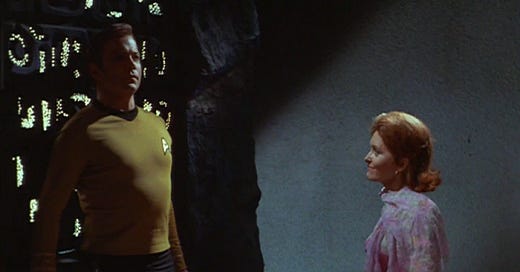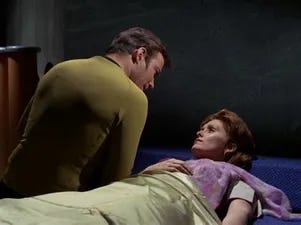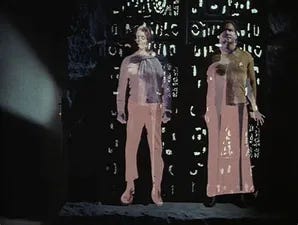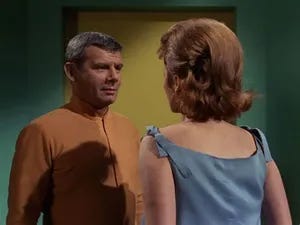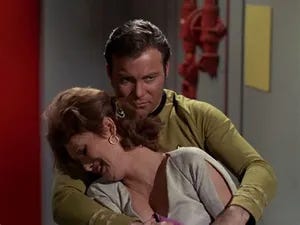Exploring Envy in the Original Star Trek Episode “Turnabout Intruder”
Beginning A Series Exploring the Classic Science Fiction Show Through a Faith-Based Lens
Written by Arthur H. Singer, based on a story by Gene Roddenberry, “Turnabout Intruder” has the unfortunate distinction of being the last original Star Trek: TOS episode to air. What’s more, the episode concerns a female character beset with a condition known as “penis envy” who is provided an opportunity to take her envy to its evil end. More so, her evil plot involves a trans-body/sexual experience of a kind. These topics would be too hot to handle in today’s sensitive popular culture, but are taken up bravely by Star Trek way back in 1969.
If great goodness can come from battling against your weaknesses, the opposite is true when giving in to them. Even worse, what happens when, rather than fighting against it, we let our vice take over to become an evil obsession? Surely it will poison our souls and great evil will result. Especially with envy, which according to the Catechism of the Catholic Church, “is a capital sin,” which means that it is a source or starting point from which other sins will be committed. “It refers to the sadness at the sight of another's goods and the immoderate desire to acquire them for oneself, even unjustly.” St. Augustine, as quoted in the Catechism, taught that, "From envy are born hatred, detraction, calumny, joy caused by the misfortune of a neighbor, and displeasure caused by his prosperity."
Most of us have experienced this vice, even if just in the form of a pang, such as when we see (for example) a handsome man driving past in a brand-new BMW with a beautiful girl in the passenger seat. In that instant, we may picture ourselves taking the place of that man (or woman), coveting what he or she has. “What I’d do if I had that,” we may utter under our breath. “Turnabout Intruder” takes that experience of envy to the fantastic level. In this case, it’s a female character, Dr. Janice Lester, an old flame of Captain Kirk’s (played by Sandra Smith). Lester is provided the grotesque opportunity to physically take the place of Kirk, actually replacing his spiritual essence with her own, and taking over his body.
The episode has been criticized for portraying a woman with penis envy, an unjust characterization of women who want the same opportunities as men in a given profession. And while many critics instinctively label “Turnabout Intruder” misogynic for merely daring to explore such a character, the episode makes no statement that Lester is generally representative of women who seek opportunities in a field of endeavor dominated by men. I believe that women labeled with penis envy would be quick to point that it doesn’t take a penis to do the job they are seeking, so penis envy is not their chief issue. When they experience other emotions resulting from the injustice at being denied what they believe is their calling, frustration, anger and sadness, just to name a few, it is not envy that produced them. In contrast, “Turnaround Intruder” portrays a woman who has all those emotions, but they all originate from her envy.
As portrayed in the story, Lester hates her own womanhood because she feels called to be a starship captain, a position, at least for this story, that is unavailable to women. In her envy, Lester comes to hate her former lover, Kirk, and experiences great displeasure at his fantastic success as a starship captain. She has an inordinate desire for Kirk’s goods, his life and career. In fact, she becomes insanely envious of Kirk. It was not enough to love him; she wants to be him, and she gets the chance to make that happen. In this way, the story exhibits what it might actually take to have penis envy: the suffering woman would want to become a man, not just take his job.
The episode starts as the Enterprise is responding to a distress call from an archaeological expedition led by Lester. Kirk and his team arrive on the planet to find her in bed, seemingly suffering from an exposure to some form of radiation. Kirk stays with her while the others check on ebbing signs of life in another part of the ruins. Lester reproaches Kirk for ending their relationship when they were younger, and descries the fact that only men could become starship captains. Kirk agrees with her that it was not fair, but reminds her that she had often tortured him over that injustice, which helped end their romance. At this, Lester activates an alien machine that immediately presses Kirk to a wall, knocking him out and immobilizing him. With a triumphant smirk, Lester enjoys her power over Kirk as she takes her place next to him and reactivates the machine. We then see ghostly images of the two people being pulled from their physical bodies and then transferred to the other body.
Lester gets just what her heart desires. She has performed her own sex-change operation; she is now physically Captain Kirk, but even better, Kirk’s spirit is now in her unwanted female body. To complete her revenge, she tries to kill her discarded female body, but hesitates briefly. While she brags about not fearing to kill, she can’t quite bring herself to kill her own body before the landing party returns.
We quickly learn that Dr. Colman (played by Harry Landers), the expedition’s medical officer, is in league with Lester and knows what she has done to Kirk, that her spirit is occupying Kirk’s body. But Colman’s motivations are difficult to understand. Lester enlisted his help in first killing off the members of her team so that she could make a distress call to get the Enterprise to respond. He did not directly kill them, but failed to treat them correctly for the radiation exposure they received. Even so, Lester uses this against him to force him to keep silent about her transference to Kirk’s body. He cooperates with her to keep Kirk, in Lester’s body, from revealing who he is. He also assists Lester in an attempt to kill Kirk (in her body) believing that if they kill Lester’s body with Kirk’s spirit inside her, the transference of spirits will be made permanent. And yet, after their plot is foiled, and Kirk’s and Lester’s spirits return to their rightful bodies, we learn that Colman is and has always been in love with Lester.
Which seems odd. If Colman was in love with Lester, it is difficult to understand why he would be so willing to kill Lester’s body. He would believe her spirit would live on, but would that enough for him? While this is a unique situation, I believe most people, when truly in love, are in love with that other person for their body and spirit—both are as important to that love as the other. And perhaps Colman does feel this way all along as he shows seemingly genuine relief that they were stopped in time from killing Lester’s body. At his profession of love for her, the others are so moved by his declaration that they mercifully allow him to take care of the now distraught and likely insane Lester.
Considering the central feature of this story, the spiritual switch of bodies, some philosophies see humans as having two natures, a physical nature, the body, and a spiritual one, the soul within the body. Further, many believe that the spirit inside you is what really counts and that the body (“crude matter,” as Yoda describes it), is unimportant. Still further, many today have adopted the belief that your body and spirit can be misaligned, that your outward body may be one sex, but the “ghost inside you” might just be another. Thus, they seek to transform their bodies to correspond with their spirit. While Lester has combined this with insane envy and the theft of another’s body, her actions indicate that this is her philosophy as well. Even though she finds it difficult to kill her body, she believes it is unimportant compared to her spirit, which can inhabit the body she wants to have.
Catholic theology teaches that we are not two natures united (body and soul), but rather we are a union of soul and body that forms a single nature. “The unity of soul and body is so profound that one has to consider the soul to be the "form" of the body.” (Catechism, # 365). This truth, I believe, emphasizes that our physical bodies are just as important to our makeup as our spiritual soul. For that matter, our body’s biological sex is united body and soul. A woman is a woman, inside and out, both physically and spiritually. Once more, we cannot change the spiritual side of ourselves even if our science discovered a way to transform a body from one sex to another. Lester, if spiritual transference was possible, created a unique situation where a female spirit is placed inside a male’s body, yet she is not united body and soul with Kirk’s body. Perhaps unintentional on the part of the writers, the fact that Kirk’s and Lester’s spirits have an inclination to return to their own bodies goes to demonstrate this disruption in this natural unity of body and soul. Lester, had she succeeded in killing her body, would have been killing both herself and Kirk. The death of her body would have finalized the interruption of the union between her body and soul. Her spirit would live on, as it would in death, but simply temporarily housed in Kirk’s body. And, for all we know, Kirk’s soul might have returned to the unity with his body, joining Lester in his body.
“Turnabout Intruder” points to a very real problem that a certain set of people face, a dissatisfaction with their own bodies. We see it in people calling themselves transsexuals, but we also see it in other persons, such as those who engage in excessive plastic surgery, tattoos, or even body building. We have a hunger for a transformation of the body to something better. Yet all these methods, from sex change to plastic surgery, are so very limited. Christian belief is so much more than that, as stated in the Apostles Creed, “I believe... in the resurrection of the body and life everlasting.” This belief goes far beyond anything envisioned in a medical procedure. The Church teaches that at the final judgment at the end of time, our bodies will be returned to us, and the just will have transformed, supernatural bodies like Christ’s own risen body. The unity of our spirit, soul and body will be complete. Lester was seeking what she believed was a better body in this life, and she was doomed to failure, and disappointment.
Bottom line, in a time when many in the culture are trying to turn envy into a virtue by portraying the victims of envy as the bad guys (by calling them “privileged”), it’s not a surprise that “Turnabout Intruder” is not on everyone’s favorite list. Even further, portraying a transsexual experience in any negative light would certainly not produce many positive reviews these days. In short, if you have Star Trek: TOS on DVD, and especially this episode—hold on to it.


